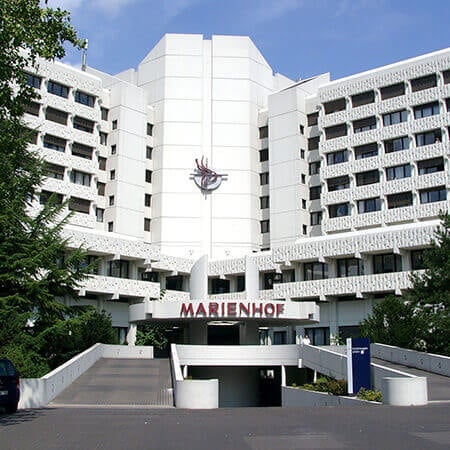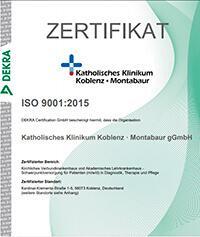Recurrent back pain can be a result of injury. But sometimes the cause of pain can be a spinal cord tumor – a malignant or benign neoplasm that develops in the spinal cord.
Benign tumors occurring in most organs are not very dangerous. But with the spinal cord, the situation is different. A spinal cord tumor, whether malignant or benign, may pose a threat to the patient's life. However, advances in the treatment of spinal tumors offer treatment options previously not available to patients with the condition.
Content
- Prevalence of spinal cord cancer
- The signs of spinal cord cancer
- Is it easily diagnosed?
- Surgical treatment
- Radiation therapy
- Conservative treatment
- Where is it possible to undergo treatment in Germany?
- The cost of treatment in Germany
- Treatment with Booking Health
Prevalence of spinal cord cancer
Specifically, malignant tumors of the spinal cord account for up to 10% of cancer patients. Approximately 15% of all primary CNS cancers originate in the spinal cord, with an estimated incidence of the disease resulting in 1 or 2 cases per 100,000 population.
The incidence of primary spinal cord tumors peaks in patients 30 to 50 years of age. Some CNS tumors, such as neuroblastoma, occur almost exclusively in children.
Spinal cord malignant tumor is an abnormal cancerous growth in the spinal cord or around it.
Treatment includes surgeries, radiation therapy, chemotherapy, and symptomatic treatment.
Cost of microsurgical tumor removal starts from €8,697. You can find prices for other therapeutic options on the Booking Health website.
The best hospitals in Germany are:
- University Hospital of Ludwig Maximilian University of Munich
- Helios Hospital Krefeld
- University Hospital Rechts der Isar Munich
- University Hospital Frankfurt-am-Main
- Clinic of Advanced Biological
The signs of spinal cord cancer
The manifestations of spinal cord cancer, especially at the onset of development, are often indistinguishable from the symptoms of other back diseases like degenerative disc disease or rheumatic disorders. As a rule, the real clinical picture begins to manifest itself only as the disease progresses, and this can take several years.
The main symptoms of the spinal tumor may include pain, impaired sensitivity in arms or legs, motor disorders, impaired urination, and bowel movement.
A gradual pain increase (from discomfort to vivid sensations) indicates the development and increase in tumor volume in the spine. Painful sensations may be concentrated in one place, or irradiate into the extremities, intensifying in the lying position. In most cases, simple analgesics do not help to stop the pain.
As the tumor develops, numbness in the legs or hands begins to occur, and there is a noticeable cold sensation in the fingers. In some cases, patients notice the opposite symptoms like a feeling of heat, burning, tingling, or itching of the skin.
Motor disorders can also be an indication of spinal cord malignant tumors. The patients with a tumor in the spine notice weakness in the legs. For some patients it becomes difficult to walk, and the gait can be changed towards more fatigue featured. The pathological condition can cause muscle spasms and impairments of the vestibular function. The advanced cases are characterized by paralysis of the leg.
The problems with urination and bowel emptying (severe constipation, uncontrolled diarrhea, and urination) may also be the signs of the presence of a malignant tumor in the spine.
General intoxication symptoms are likely to be present with the tumor in the spine as well. The malignant process affects the patient's general health condition that shows up as a weakness, unexplained fatigue, weight loss, etc.
Most spinal cord tumors are detected during routine diagnostic examinations performed for the reason of neck or lower back pain. The examination begins with a physical exam. An X-ray is then used to diagnose structural changes in the spine, but its results may not be sufficiently informative. And when there is a need for a clearer imaging of both bone and soft tissues, CT or MRI is prescribed. In addition, scintigraphy (or gamma scan) may be used, if a malignant tumor is suspected in the spine.
Is it easily diagnosed?
Well, it depends on the methods chosen for the diagnostics.
The most common methods for diagnosing spinal cord tumors include CT and MRI. They allow doctors to determine the exact tumor localization, its shape, size, and its level of interaction with neighboring structures.
The information obtained with MRI and CT allows specialists to accurately assess the specifics of the tumor, as these diagnostic methods are the most sensitive in examining the spine for the presence of a neoplasm.
If the spinal cord tumor is located in the soft tissue, it can be diagnosed by ultrasound, which is a fairly accurate and safe technique for diagnosing spinal cord neoplasms, but it doesn’t provide detailed enough information if used alone. In medicine, ultrasound shows the presence of tumor formation and can differentiate it from a cyst, for example, but it cannot show whether it is cancerous.
For this purpose, doctors use biopsy. It involves taking a tissue sample of the spinal cord from the patient's body for further examination for signs of disease. And this is so far, the most precise method of diagnosing spinal cord malignant tumors.
Surgical treatment
Ideally, the goal of therapy for spinal cord neoplasm is to fully remove it, but the task is often complicated by the risk of irreversible damage to the spine tissue. To avoid that, physicians must take into consideration the age of patients, general state of their health, and the features of the tumor they are diagnosed with.
Spine surgery is often the forefront of treatment tactics with a condition that a tumor is operable.
Thankfully, new medical techniques and tools allow doctors to find access to previously inaccessible tumors. An example would be powerful microscopes used during the intervention that help visually distinguish the tumor tissue from the healthy tissue. If necessary, specialists also examine the nervous tissue during surgery, thereby reducing the possibility of neurological damage to the spine.
The spine surgery to remove spinal cord tumors is performed by a multidisciplinary team with the participation of neurophysiologists using intraoperative monitoring. The application of this progressive medical technology makes it possible to monitor the functional state of the spinal cord during the surgical intervention, to differentiate spinal cord structures during surgery, which allows achieving optimal functional results of treatment with preservation of motor and sensory functions, as well as controlling pelvic functions in patients.
Even with today's advances in tumor treatment, not all tumors can be completely removed. The surgical removal is the best option for many intramedullary tumors, but large ependymomas located in the terminal region of the spine can be impossible to remove because of the large number of nerves in that area. And while benign spinal tumors can usually be removed completely, metastatic tumors are usually not operable.
Generally, the treatment of patients with intramedullary tumors using spine surgery is possible in cases of locally limited neoplasms with pronounced outlines and distinction with the spinal cord. But when the border between the tumor and the spinal cord is not always differentiated, the tumor is partially removed. The surgery is followed by radiation and/or chemotherapy.
After the surgical intervention, patients usually undergo radiation and/or chemotherapy, if necessary.
Rehabilitation after spinal surgery takes some time, and the duration of this period is based on the type of the surgical treatment conducted.
Radiation therapy
The radiation therapy method can be the primary treatment for inoperable tumors and aggressive lesions of the spinal cord. Radiation therapy may be useful for residual tumors after surgery or recurrent tumors, but it has specific indications as well.
Side effects of radiotherapy include acute and delayed myelopathy, reduced skeletal growth in young children, increased difficulty with subsequent surgical removal of the tumor. Therefore, aftereffects are important to consider if radiotherapy will not impact the growth of the neoplasm significantly.
Conservative treatment
Chemotherapy, immunotherapy, and targeted therapy can also be used for the treatment of the spinal cord tumor. However, these medical methods so far have experimental status in medicine in terms of their independent use. Some therapy regimes are currently being evaluated, primarily for the treatment of spinal cord tumors in children.
The experimental treatment for metastatic cancer of the spinal cord in Germany may involve the use of chemotherapy and immunotherapy. In this case, protocols developed for the treatment of the underlying cancer are used. For secondary metastases, targeted therapy drugs for the underlying neoplasm can be effective. However, the correlation of effectiveness is not as direct as in the case of chemotherapy and immunotherapy.
Where is it possible to undergo treatment in Germany?
The best hospitals for the treatment of spinal cord malignant tumor in Germany are:
- Vivantes Auguste-Viktoria Hospital Berlin.
- Catholic Clinic Koblenz-Montabaur.
- Charite University Hospital Berlin.
- University Hospital Freiburg.
- University Hospital Frankfurt am Main.
- University Hospital Erlangen.
The Neurology Departments in the mentioned German hospitals offer the full spectrum of diagnostics and surgical treatment of various diseases, pathologies, and disorders of the central and peripheral nervous system, including the spinal cord malignant tumors and comorbidities. In the field of spine surgery, the doctors at the hospitals are proficient in all necessary surgical techniques, from herniated disc repair to complex spinal fixations.
You can find more information about each hospital on the Booking Health website.
The cost of treatment in Germany
The cost of treatment of spinal cord malignant tumor in Germany depends on the therapy course, which is chosen on a case-by-case basis. The cost of treatment is directly influenced by the specifics of the patient's diagnosis, whether there are concomitant diseases, whether surgical treatment is required, how long of a stay in the hospital is necessary, and whether the hospital is state or private. Also, the status and position of the physician and the level of comfort can be reflected in the summary estimate.
The price of the surgical treatment in Germany starts at 8,697 EUR.
The price of neurological rehabilitation starts at 540 EUR.
The price of diagnostic tests for spinal cord malignant tumors starts at 461 EUR.
You can find out all the information about the prices for both diagnostics and treatment of spinal cord tumors by filling out a request form on the Booking Health website. The medical advisor will call you shortly and provide you with the necessary information.
Treatment with Booking Health
The treatment with Booking Health is a great option for those who do not want to deal with any more additional stress and want a team of qualified people to assist in their treatment journey.
The Booking Health specialists will advise you about what documents you will need to send in (references, results of diagnostic tests). On their basis, the most appropriate scheme of treatment and possible additional examinations in the hospital can be determined in advance.
If you are interested, please leave your request on the website, so we could contact you.
Authors:
This article was edited by medical experts, board-certified doctors Dr. Nadezhda Ivanisova, and Dr. Bohdan Mykhalniuk. For the treatment of the conditions referred to in the article, you must consult a doctor; the information in the article is not intended for self-medication!
Our editorial policy, which details our commitment to accuracy and transparency, is available here. Click this link to review our policies.












